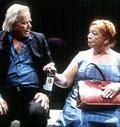SEARCH CurtainUp
On TKTS
LETTERS TO EDITOR
REVIEWS
FEATURES
ADDRESS BOOKS
Broadway
Off-Broadway
DC
NEWS (Etcetera)
BOOKS and CDs
OTHER PLACES
Berkshires
DC (Washington)
London
Los Angeles
QUOTES
FILM
LINKS
MISCELLANEOUS
Free Updates
Masthead
Type too small?
NYC Weather
First Love
|
I'm thinking: at my age how can this be your first time?
---Edith |

Ruth Maleczech and Frederick Neumann
(Photo: Joan Marcus) |
Harold (Frederick Neumann) is a down on his luck man of an uncertain age. Once a career-minded executive, he is now apparently homeless. Edith (Ruth Maleczech), also long past youth, is slightly better off. She comes to the park bench where Harold is sleeping as a respite from her underfurnished, unvisited basement apartment. She demands that Harold "shove up " so she can sit next to him. She may no longer be slim or pretty, but she's still scrappy. Her determination to claim her share of the bench prevails and their unlikely and often fantastical love story begins. Because the Grim Reaper is lurking in the shadows the relationship stages that usually span years are compressed into a brief but intense roller coaster encounter. We see Edith and Harold get acquainted (both were politically left of center), unpack their considerable emotional baggage, have sex (possibly the first senior thespians brave enough to bare all onstage), engage in a knock-down, drag-down "War of the Roses" fight, and come together again.
The intermittently realistic and phantasmal scenes provide Malaczech and Neumann, for whom the play was written, with ample opportunity to display the skills honed during their long careers, most notably as actors and directors of the Mabou Mines. Ms. Malaczech is particularly fascinating to watch. Her red hair is as obviously artificial as the leafless tree (also a bright red) protruding from a sky blue scrim wall of Klara Zieglerova's imaginative set. Edith's hairdo and the clothes she wears fit into the era of her youth. Though it's hard to say if she was ever pretty, she conveys an aura of sexuality along with her feistiness. Neumann as the more melancholy Harold is a fine foil for the more aggressive, more fulfilled (at least in the past) Edith. Mr. Mee's script tips the scales to make her the star of the enterprise, gifting Edith with the more incisive and often hilarious lines. She recalls better times with "we lost a lot when we lost communism." When he responds to her talk of being in Paris during the 60s with "I had a job", she snaps back "I had a life!"
A third cast member, Jennifer Hall, bursts onto the stage through the door of a refrigerator, temporarily transforming Edith's apartment into a cafe where Hall is a waitress who browbeats Harold into eating a raspberry tart he doesn't want (one of many symbolic replays of regrets voiced during more realistic interchanges). Hall makes two more appearance as a symbol of lost youth and sexuality. But the most memorable of the play's several pop song tinged dream sequences stars the lovers moving from the basement apartment to a player piano on the second tier of the stage. Edith climbs on top of the piano to sing and dance "I Belong to You " and "Something's Got to Give" while a top-hatted Harold sits at the keyboard. Abetted by Christopher Akerlind 's superb lighting, they team up for a 'September Song" duet that makes a persuasive case for giving love a chance to blossom at any age. This scene, like others, seems to also consciously trigger images of familiar golden oldie films -- like The Echanted Cottage, in which two physically scarred people learn to see beauty where others see ugliness and hopelessess. When Edith and Harold share a repast of crackers with their arms comically intertwined, Now Voyager with its much satrized double cigarette scene comes to mind.
Director Erin Mee (the playwright's daughter) has added many effective touches to blend the real with the imagined. She keeps the first hour of the ninety-minute intermissionless play moving along at a crisp tempo. However, by the time we get to the last third and, even with these fascinatingly oddall lovers, the play has trouble maintaining its momentum. The symbolism is too obvious and the end predictable and somewhat anti-climactic. Such caveats notwithstanding, Maleczech's and Neumann's brave performances and Mr. Mee's writing make for a worthwhile and compelling opening production in a most promising season at the always innovative New York Theatre Workshop (Director Karin Coonrod's stage adaptation of three Flannery O'Connor short stories under the umbrella title Everything That Rises Must Converge to be followed by Tony Kushner's new play, Homebody/Kabul, and Caryl Churchill's latest Far Away,).
As for Mr. Mee, you can expect to see him expounding his theories on love with two other plays -- Big Love, a Goodman Theatre production from Chicago, will be part of the Next Wave Festival at the Brooklyn Academy of Music; and, if you prefer his work that takes off on the classics, there's True Love, based on Euripides' Hippolytus and Racine's Phèdre coming to a the new Zipper Theater on West 37th Street. Clearly this is one golden aged writer who has little time to take naps on park benches.
|
First Love
Written by Charles Mee Directed by Erin Mee Cast: Ruth Maleczech/Edith, Frederick Neumann/Harold, Jennifer Hall/Melody Set Design: Klara Zieglerova Costume Design: Christine Jones Lighting Design: Christopher Akerlind Sound Design: Bo Bell Running Time: 90 minutes without intermission York Theatre Workshop, 79 East 4th Street ( 2nd Avenue and Bowery), 239-6200 8/3/01-9/23/01; opening 9/09/01. Tuesday - Friday @8PM, Saturday @3PM & 8PM, Sunday @2PM & 7PM --$45. Reviewed by Elyse Sommer based on 9/06 performance |





